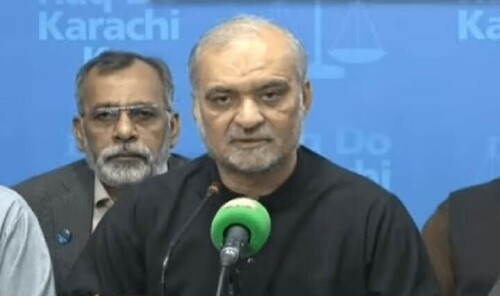KARACHI, April 29: South Asian countries including Pakistan and India have the highest rate of metabolic syndrome (MS) in the world and it is much more prevalent among women, while inactive lifestyle was the major contributor towards the disease.
This was said by Dr Anoop Misra from All India Institute of Medical Sciences, Delhi, during his presentation on “Metabolic syndrome in South Asians-current concepts and future challenges” on the first day of the Third National Endocrine Symposium, organized by the Pakistan Endocrine Society (PES) here at the Liaquat National Hospital Karachi, on Friday.
He said metabolic syndrome (MS) was a cluster of cardiovascular risk factors and metabolic alterations associated with excess fat weight.
“Its key components are central obesity, dyslipidaemia, hypertension and insulin resistance with or without glucose intolerance. Additional associated abnormalities include coagulation abnormalities, hyperuricaemia, microalbuminurea, PCOS and non-alcoholic steatohepatitis (NASH),” he told.
“For South Asians, all risk indicators are very bad including diabetes prevalence, fasting insulin etc. One of its clear cut implications is diabetes. Our population also have high C-Reactivate Protein Level,” he added.
Dr Misra said each component of MS increased the risk of cardiovascular disease and type-2 diabetes.
He said that individuals with MS were candidates for intensified lifestyle changes. Weight loss could be achieved through long-term behaviour modifications, reduced calorie diet and moderate physical activity.
The dietary intervention should include cutting down total calories, which can be done by reducing saturated fats and increasing whole grains, fruits and vegetables, Dr Misra noted.
“Physical activity recommended is 30 minutes or more of moderate exercise each day. The activity can be broken up during the day to fit the person’s schedule. Weight loss and exercise is the key to reducing visceral adiposity,” he maintained.
Dr Khalid Alrubean from Saudi Arabia delivered presentation on “Insulin therapy from discovery to new technology”.
He said metabolic syndrome was also a big problem in the gulf countries.
Dr Alrubean urged that insulin doses should be planned according to the meals of patient, as total calories intake depended on patient’s age and activity, but had to relate to the desirable body weight.
“Patients should be provided food exchange list for diet to know about calories intake. Insulin inhaler is coming in near future, as trail studies are going to complete. Diabetes patients are increasing and doctors better know the severity of problem and can use right way to address it,” he stressed.
“Physicians have an important role in helping patients prevent the development of obesity by alerting them. Such efforts should begin in childhood and include encouraging prevention of overweight and obesity” Dr Alrubean emphasized.
Dr Nadeem Ahmed of Aga Khan University Karachi talked on “Endocrine Imaging.”
Earlier, Dr Abdul Jabbar, Dr Jamal Raza also spoke. The conference will conclude on April 30.—PPI













































Dear visitor, the comments section is undergoing an overhaul and will return soon.